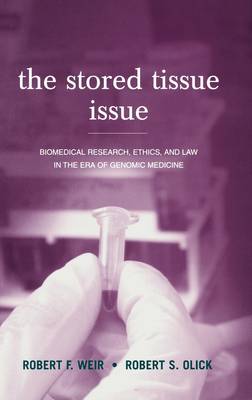
Bedankt voor het vertrouwen het afgelopen jaar! Om jou te bedanken bieden we GRATIS verzending (in België) aan op alles gedurende de hele maand januari.
- Afhalen na 1 uur in een winkel met voorraad
- Gratis thuislevering in België vanaf € 30
- Ruim aanbod met 7 miljoen producten
Bedankt voor het vertrouwen het afgelopen jaar! Om jou te bedanken bieden we GRATIS verzending (in België) aan op alles gedurende de hele maand januari.
- Afhalen na 1 uur in een winkel met voorraad
- Gratis thuislevering in België vanaf € 30
- Ruim aanbod met 7 miljoen producten
Zoeken
The Stored Tissue Issue
Biomedical Research, Ethics, and Law in the Era of Genomic Medicine
Robert F Weir, Jeffrey C Murray, Robert S Olick
Hardcover | Engels
€ 109,95
+ 219 punten
Omschrijving
Genetics research with stored human tissues provides many benefits and holds much promise. Yet how this critical research is conducted sometimes raises serious ethical, legal, and social concerns, and it is difficult to balance the promise of biomedical research with our time-honored commitments to individual choice in such fundamental matters as control over personal health information and the disposition of our bodily tissues.
Weir and Olick provide a thorough analysis of this critical phase in the era of genomic medicine. While strongly supportive of the biomedical research enterprise, they develop a critique of many common research practices with banked tissues, DNA, and genetic data. Noting numerous examples of beneficial human tissue research, they focus on problematic research practices, controversial cases, and federal and institutional policies that limit the informed choices of patients and research participants. The authors offer a series of recommendations intended to limit the risks of inadequate informed consent to research for individuals, families, and groups, and to strengthen the bonds of trust between the research enterprise and the public upon which biomedical progress depends.
This book offers a wealth of information plus well-reasoned recommendations that will be of keen interest to geneticists, other biomedical scientists, research institutions, policymakers, students and others. It will serve as a clarion call to move beyond traditional policies and practices toward a richer understanding of partnership between patients and research participants and the biomedical research enterprise - a partnership for the benefit of all.
Weir and Olick provide a thorough analysis of this critical phase in the era of genomic medicine. While strongly supportive of the biomedical research enterprise, they develop a critique of many common research practices with banked tissues, DNA, and genetic data. Noting numerous examples of beneficial human tissue research, they focus on problematic research practices, controversial cases, and federal and institutional policies that limit the informed choices of patients and research participants. The authors offer a series of recommendations intended to limit the risks of inadequate informed consent to research for individuals, families, and groups, and to strengthen the bonds of trust between the research enterprise and the public upon which biomedical progress depends.
This book offers a wealth of information plus well-reasoned recommendations that will be of keen interest to geneticists, other biomedical scientists, research institutions, policymakers, students and others. It will serve as a clarion call to move beyond traditional policies and practices toward a richer understanding of partnership between patients and research participants and the biomedical research enterprise - a partnership for the benefit of all.
Specificaties
Betrokkenen
- Auteur(s):
- Uitgeverij:
Inhoud
- Aantal bladzijden:
- 366
- Taal:
- Engels
Eigenschappen
- Productcode (EAN):
- 9780195123685
- Verschijningsdatum:
- 20/05/2004
- Uitvoering:
- Hardcover
- Formaat:
- Genaaid
- Afmetingen:
- 164 mm x 241 mm
- Gewicht:
- 648 g

Alleen bij Standaard Boekhandel
+ 219 punten op je klantenkaart van Standaard Boekhandel
Beoordelingen
We publiceren alleen reviews die voldoen aan de voorwaarden voor reviews. Bekijk onze voorwaarden voor reviews.









